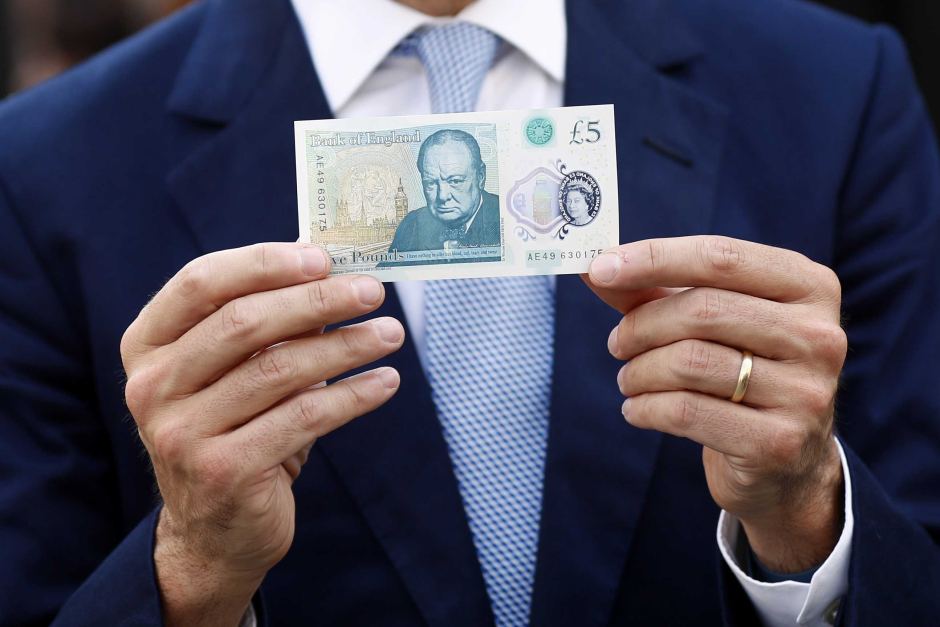Category: Animal Welfare / Business, Economics and Finance / Money and Monetary Policy / Lifestyle and Leisure / Community and Society
Vegetarians angry animal fat used in Britain's new fiver
Wednesday, 30 Nov 2016 12:04:17

Bank of England governor Mark Carney poses with a new polymer five pound note at Whitecross Street Market in London, Britain on September 13, 2016. (Reuters: Stefan Wermuth)
Animal activists are up in arms and calling for change in the UK after confirmation Britain's newly released five pound note contains animal fat.
Key points:
- The Bank of England has confirmed its new polymer five pound note contains tallow (a hard animal fat)
- Vegans, vegetarians say it is unnecessary to use animal products in today's currency
- Both Australia's and Britian's polymer banknotes are supplied by the same manufacturer
Britain is currently in the process of replacing its paper notes with new notes printed on polymer, a thin and flexible plastic material.
The notes are easier to handle, cleaner, more long-lasting and also allow for extra security features, making them harder to counterfeit.
But the Bank of England has confirmed the material contains traces of tallow, a type of hard animal fat commonly used in other household objects such as candles and soap.
The confirmation sparked outrage among animal activists, who argue it is unnecessary to include animal products in today's currency.
"I will no longer be accepting these notes," Twitter user Angela wrote.
"Remove them from circulation immediately. Offensive and a disgrace to all vegans and vegetarians," said Clive Shrubsole.
In the 48 hours following the announcement, more than 69,000 people signed a petition posted on Change.org calling for the bank to cease using tallow in future notes.
"The new 5 [pound] notes contain animal fat in the form of tallow. This is unacceptable to millions of vegans, vegetarians, Hindus, Sikhs, Jains and others in the UK," the petition states.
"We demand that you cease to use animal products in the production of currency that we have to use."
What about Australian notes?
Australia was the first country to adopt polymer banknotes.
They were developed by the Reserve Bank of Australia as a way to crackdown on major counterfeit fraud following the country's migration to the decimal system in 1966.
Both Australia's and Britain's polymer banknotes are supplied by the same manufacturer — Innovia Security.
Innovia spokesperson Carlos Fernandez told the ABC miniscule amounts of tallow is also used in producing Australia's banknotes.
Mr Fernandez said the film on the notes contains small amounts of additives that act as stabilisers, anti-block, anti-static, slip agents or as other functional processing aids, but that the additives comprise less than one per cent of the total weight of the film.
"Of the less than 1 per cent of additive material, a trace amount of tallow is used by some of our component resin suppliers," he said.
The company supplies 78 denominations in 24 countries.
Britain's new five pound note was released into circulation in September. A new polymer 10 pound note is set to be released next year, while the 20 pound note will be issued in 2020.
The Bank of England has said it will make a decision on whether to print a new 50 pound note on polymer "in due course".
- About Us
- |
- Terms of Use
- |
-
 RSS
RSS - |
- Privacy Policy
- |
- Contact Us
- |
- Shanghai Call Center: 962288
- |
- Tip-off hotline: 52920043
- 沪ICP证:沪ICP备05050403号-1
- |
- 互联网新闻信息服务许可证:31120180004
- |
- 网络视听许可证:0909346
- |
- 广播电视节目制作许可证:沪字第354号
- |
- 增值电信业务经营许可证:沪B2-20120012
Copyright © 1999- Shanghai Daily. All rights reserved.Preferably viewed with Internet Explorer 8 or newer browsers.




 Send to Kindle
Send to Kindle